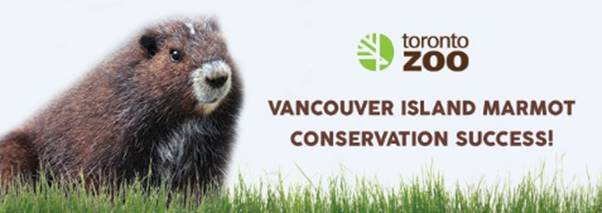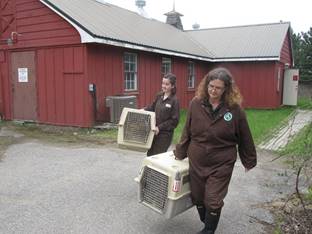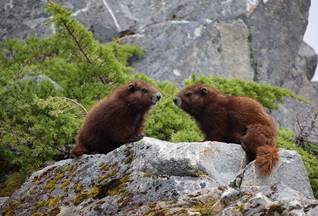
VANCOUVER ISLAND MARMOT UPDATE
TORONTO ZOO IS COMMITTED TO SAVING & PROTECTING
ENDANGERED CANADIAN SPECIES

Sarah Tyndall (Left) and Gerri Mintha (Right), Wildlife Health loading Vancouver Island Marmots: Photo Credit Toronto Zoo

Yearling Vancouver Island Marmots in Mount Washington: Photo Credit Hannah Sungaila
TORONTO, ON Thursday, April 27, 2017: The Vancouver Island marmot (VIM), is one of the most critically endangered animals in the world, and is Canada's MOST endangered mammal. The Toronto Zoo has been an active participant in the conservation breeding program for the Vancouver Island marmot since 1997, when it was first approached by the Marmot Recovery Foundation to begin a conservation breeding and release program. This marmot species is only one of six mammals endemic to Canada and was North America’s most endangered mammal in 2003, when there were as few as 30 individuals left in the wild.
Because of significant captive breeding efforts, including the Toronto Zoo's, the wild population has steadily grown. The Toronto Zoo has also been involved in many research projects to help increase our understanding of this unique mammal and has spearheaded studies on mating behaviour, pup development and hormone analysis for monitoring reproductive cycles of breeding females. This information is vital to ensure that the breeding and reintroduction program is successful and that the VIM continues to live in the wild.
On Wednesday, April 26, 2017, in celebration of Canada’s 150th anniversary, the Toronto Zoo was proud to continue its commitment to the recovery program sending seven VIM yearlings to the Tony Barrett Mount Washington Marmot Recovery Center for release in 2017. In May of 2016 the Zoo was excited to share news that two of the six resident pairs of adult marmots gave birth to nine pups in total, helping to increase the numbers of the Zoo’s population.
"With the expertise, passion and commitment from zoological organizations like the Toronto Zoo, the Vancouver Island marmot conservation breeding and reintroduction program has been crucial in preventing this species from becoming extinct," says Maria Franke, Curator of Mammals, Toronto Zoo. "This program truly is a testament to the tremendous effort that so many partners have made to the program over the years," added Franke.
To date, joint efforts from four facilities have released 490 captive-born marmots back to Vancouver Island and the population is now estimated between 140 to 191 individuals. It is an exciting time for the VIM conservation breeding efforts, as it is a very good possibility that a milestone 500th captive marmot could be released in 2017! Conservation efforts in Vancouver continue to protect marmot habitat to help ensure the recovery of this highly-endangered Canadian species.
*Please note, the Vancouver Island marmots are not viewable to the public or media.
If you require photos or video assets please contact:
Katie Gray, Supervisor of Public Relations and Events
[email protected] or #416-392-5941
Amanda Chambers, Public Relations and Events Associate
[email protected] or #416-392-5974

